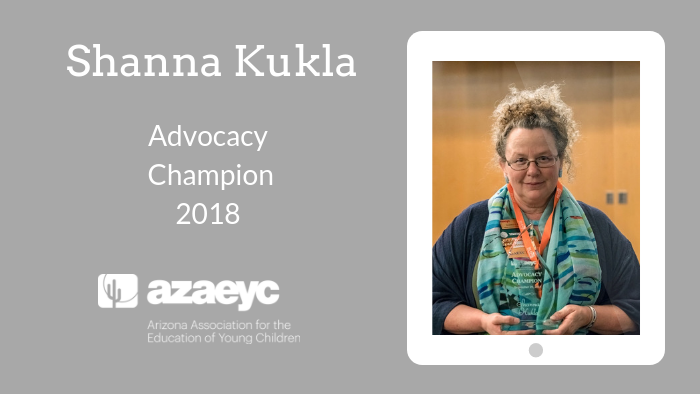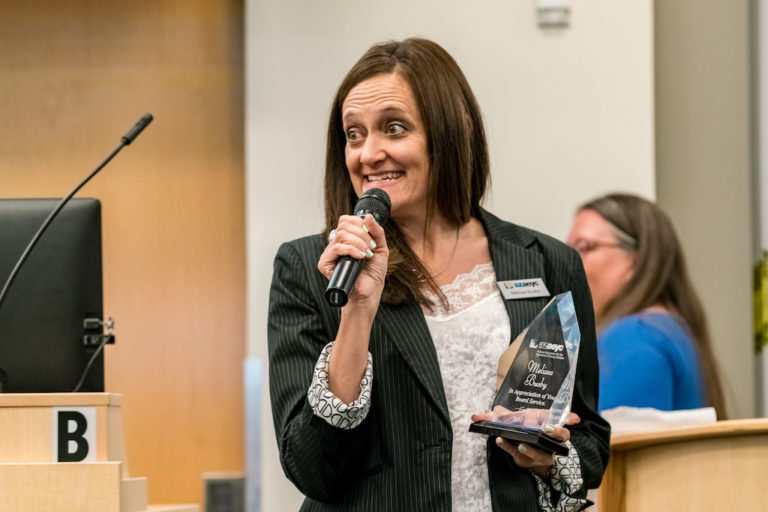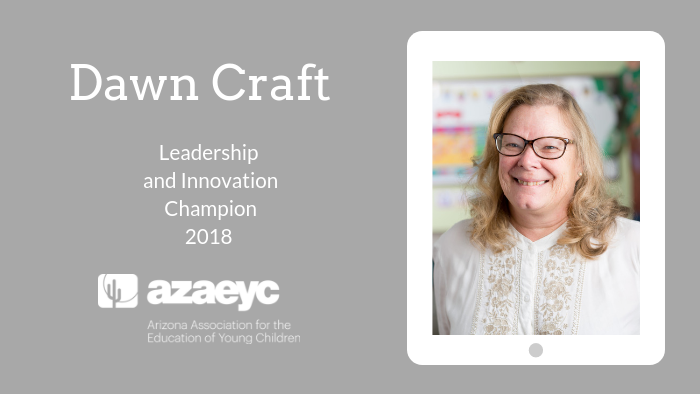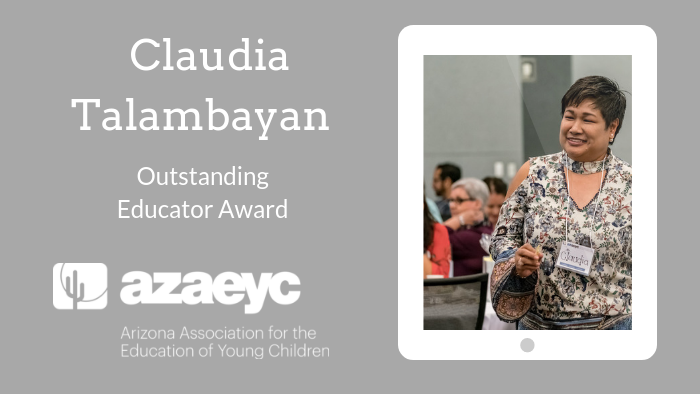The first inaugural Advocacy Champion Award was presented to Shanna Kukla at AzAEYC’s Annual Meeting on September 29, 2018.
We asked Shanna to answer five questions about her career, her work in the field, and to reflect on the value of the pursuit of diversity and equity in early childhood education.
Why did you enter the field?
I entered the field as an assistant Early Childhood Educator when I was 19- largely because I needed a job but also because I wanted work that was important and valuable. I was fortunate to land in a program where the director was a mentor and a visionary educator for the children, families, and staff in her school.
I have continued in the Early Childhood field for the past 35 years. I was a teacher for 18 years, a preschool director for 4 years, and for the past 11 years I have worked in Early Childhood Higher Education systems. I spent 16 years completing a bachelor’s degree while working full time in the field. Early on, I was encouraged by a college instructor to join NAEYC and I have been a member ever since.
What is your current role in the field?
I support Early Childhood college and university students. My role is focused on strengthening Early Childhood college and university students’ capacity to navigate, excel in, and complete programs of study from their chosen institutes of higher education. I create and advance Early Childhood higher education services, programs, and pathways that promote retention, transfer, and degree completion for our field’s diverse population of Early Childhood college and university students.
What’s the biggest challenge of being an advocacy champion?
The BIGGEST Challenge? Someone once said, “We are all faced with a series of great opportunities brilliantly disguised as impossible situations.” Many in our field are simultaneously Early Childhood Educators AND college or university students. For them, going to school while working full time (in a job that frequently includes low salary and no benefits) and having family responsibilities requires extraordinary effort. That is the biggest challenge!
What is satisfying to you about this work?
When I meet with a student and support them in the creation of a “challenging but achievable” plan for degree completion, it is extraordinarily satisfying. When I speak to power about the realities of the challenges that so many Early Childhood students face every day as teachers and learners, it is satisfying. When strategies I have developed and worked to implement are effective for the Early Childhood workforce, it is satisfying.
When I consider the increase in Pima Community College Early Childhood graduation rates over the past decade, an increase that holds the stories of many graduates who credit my work as an important part of their success, it is satisfying. When I consider the elevation of the Early Childhood Associate of Applied Science to Early Childhood Bachelor’s of Applied Science Transfer Pathways and my continuing role in strengthening and developing the capacity of those pathways, it is satisfying. When Arizona’s Early Childhood Associate and Bachelor’s programs commit to NAEYC accreditation for their degree pathways, it is satisfying. When members of the Somos Enlace Early Childhood Organization begin to stretch their wings and take flight, it is satisfying.
In so many, many, ways — this work is satisfying!
Any inspiring words for others in our profession?
Find a mentor, find your professional tribe, and be a member of the National Association for the Education of Young Children! We can do it, we can ensure that young children and their families have opportunities for highest quality early experiences, but this work is a heavy lift. We in the Early Childhood workforce need relationships and community in order to thrive and to be our best, most effective selves.
¡Si se puede! ¡Somos Enlace!
The Advocacy Champion award recognizes an individual who is focused on visible and meaningful advocacy for the workforce that addresses compensation, education, and positive working environments. This individual has worked collaboratively to challenge and change policies, laws, systems, and institutional practices to promote diversity and equity in the early childhood field. They pursue opportunities to exemplify early childhood professionals as vital and performing a critical role in society.




